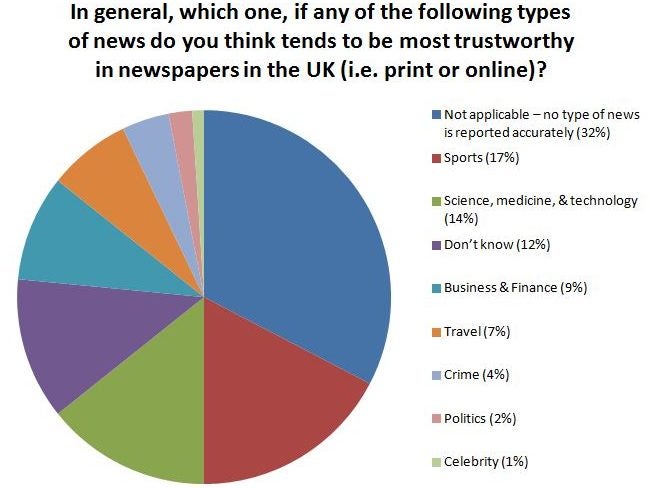
Almost one third of British adults believe that no type of news – from politics to crime – is reported accurately, honestly and without bias, in newspapers according to a new YouGov survey.
A total of 32 per cent of the 2,068 people surveyed online deemed no news to be “trustworthy”, with sports receiving the highest vote of confidence at 17 per cent.
The poll was carried out between 9 and 10 January on behalf of communications firm Matter PR.
Those surveyed were asked: “In general, which one, if any of the following types of news do you think tends to be most trustworthy in newspapers in the UK (i.e. print or online)?”
Participants were told that trustworthy in this context meant “reporting that is unbiased, accurate and honest”.
Sports was followed by science, medicine and technology news at 14 per cent, “don’t know” at 12 per cent, and business and finance news at 9 per cent.
Celebrity news came bottom at 1 per cent, just below politics news at 2 per cent.
Among full-time students, science news came out top with 21 per cent believing it to be the most “trustworthy”.

Source: YouGov survey
David Reid, managing director of Matter PR, said: “Matter PR commissioned this survey to see if science news stories are still considered trustworthy by the public, despite recent global trends seeing trust in experts at an all time low.
“Whilst the results are reassuring for science, it is all relative and shows that trust in the print and online news media is very low overall.
“Scientists need to work hard to improve people’s trust in them. Stories which are hyped-up, exaggerated claims, and silly stunts might be good copy but do a lot of damage.
“Clear, engaging, and honest communication with the public should be at the heart of what every science organisation in the UK does – it must not be considered an optional extra.”
Email pged@pressgazette.co.uk to point out mistakes, provide story tips or send in a letter for publication on our "Letters Page" blog
